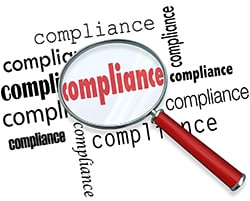The Chamber of Commerce has commenced a well-financed and aggressive lobbying campaign to undermine America’s most effective whistleblower law, the False Claims Act. To justify its anti-whistleblower campaign the Chamber published a report entitled, “Fixing the False Claims Act: the Case For Compliance-Focused Reforms.” The purpose of this blog series is to combat the Chamber’s misinformation, and explain why the False Claims Act must be protected.
Fact Number 13:
The Chamber of Commerce uses the phrase “corporate compliance” in a misleading and disingenuous manner. In a major U.S. Court of Appeals 2014 case, the Chamber’s position on such internal compliance programs was clarified. The Chamber vigorously argued that such programs were, as a matter of law, part of a company’s General Counsel. They argued that compliance departments were not independent investigatory bodies, but simply fact-finding bodies designed to provide information to company attorneys. As such, compliance investigations could operate in complete secrecy, and their findings could be kept secret from the government, even if subpoenaed.
In the appeals court case of In re KBR, the Chamber joined with the largest Iraq War defense contractor, KBR-Brown & Root, to successfully suppress the findings of KBR’s compliance program.
The lower court had reviewed the compliance records and determined that the records proved that KBR engaged in serious fraud against the taxpayer. However, the Chamber prevailed on appeal, and succeeded in suppressing the public release of these documents, because they were part of the confidential corporate attorney managed “compliance” program.
The Chamber’s success in KBR is even more troubling, given the lower court’s findings that were all reversed on appeal. The federal trial judge privately reviewed the “compliance” records and found them to be “eye-openers,” demonstrating that KBR employees were “paid off” resulting in contracts being awarded that were “more expensive to the United States,” despite “terrible performance” and “regular attempts to double bill.”
But the appeals court agreed with the Chamber’s argument, and held that the compliance department was, in fact, not independent, but was simply an arm of the company’s General Counsel, with a mission to serve the best interests of its client.
Such programs, when stripped to their essence, are not compliance programs at all. They are simply arms of the corporation’s legal department, with the mission of protecting the company from regulatory sanction or liability for fraud. They are the foxes that guard the chicken coops.
Whistleblowers and their supporters are strongly urged to read this blog series and share it with friends. In addition, an Action Alert has been issued by the National Whistleblower Center so members of the public inform their representatives that the False Claims Act should not be “reformed” as proposed by the Chamber.
